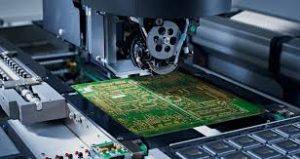Can printed circuit board assembly manufacturer be recycled easily?
- by admin
- Posted on May 16, 2024
Can printed circuit board assembly manufacturer be recycled
Printed circuit board (PCB) assembly is a fundamental component of electronic devices, providing the essential framework for connecting and controlling various electronic components. However, concerns about the environmental impact of electronic waste (e-waste) have prompted questions about the recyclability of PCB assemblies. Can PCB assembly manufacturers implement recycling processes effectively to mitigate the environmental footprint of electronic devices?
The recyclability of PCB assemblies depends on several factors, including the materials used in their construction, the complexity of their design, and the availability of recycling infrastructure and technologies. Traditional PCB assemblies often contain a variety of materials, including fiberglass-reinforced epoxy laminate for the substrate, copper for conductive traces, and various solder alloys for component attachment. While these materials are recyclable in theory, the challenge lies in separating and recovering them efficiently and cost-effectively.
One of the primary obstacles to recycling printed circuit board assembly manufacturer is the complex and heterogeneous nature of their construction. PCBs often consist of multiple layers of substrates, conductive traces, and components, which are tightly integrated and interconnected through solder joints and adhesive materials. Disassembling and separating these components manually is labor-intensive and time-consuming, making traditional PCB assemblies less economically viable for recycling.

Can printed circuit board assembly manufacturer be recycled easily?
Moreover, the presence of hazardous substances in PCB assemblies, such as lead, mercury, and brominated flame retardants, poses additional challenges for recycling and disposal. These substances can pose serious risks to human health and the environment if not handled properly, requiring specialized techniques and facilities for safe extraction and treatment. The presence of hazardous materials further complicates the recycling process and may deter recyclers from accepting PCB assemblies for recycling.
However, advancements in recycling technologies and processes offer promising solutions for addressing the challenges of PCB assembly recycling. Innovations such as mechanical shredding, thermal treatment, and chemical separation enable the efficient recovery of valuable materials from PCB assemblies while minimizing environmental impacts. Automated sorting systems and advanced separation techniques can enhance the recovery rates of metals, plastics, and other materials from e-waste streams, including PCB assemblies.
Furthermore, initiatives and regulations aimed at promoting sustainable e-waste management and recycling are driving industry-wide efforts to improve the recyclability of electronic components, including PCB assemblies. The implementation of extended producer responsibility (EPR) programs, which require electronics manufacturers to take responsibility for the end-of-life management of their products, incentivizes the design of products with recyclability and resource efficiency in mind. Manufacturers are increasingly incorporating design for recycling (DFR) principles into their product development processes, emphasizing the use of recyclable materials, modular designs, and easy disassembly for recycling purposes.
In conclusion, while challenges exist, the recyclability of PCB assemblies is achievable with the right technologies, infrastructure, and regulatory frameworks in place. Manufacturers play a crucial role in driving the adoption of sustainable practices and designing products with recyclability in mind. By leveraging innovations in recycling technologies and collaborating with stakeholders across the value chain, PCB assembly manufacturers can contribute to the reduction of e-waste and the transition to a more circular economy.
Can printed circuit board assembly manufacturer be recycled Printed circuit board (PCB) assembly is a fundamental component of electronic devices, providing the essential framework for connecting and controlling various electronic components. However, concerns about the environmental impact of electronic waste (e-waste) have prompted questions about the recyclability of PCB assemblies. Can PCB assembly manufacturers implement…
